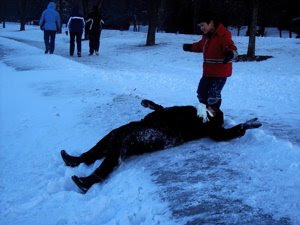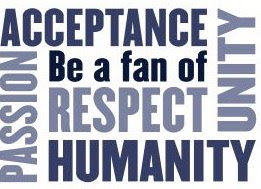 The Canadian Council on Learning has posted their online literacy assessment tool.
The Canadian Council on Learning has posted their online literacy assessment tool.
The tool can be used to assess your IALSS level. IALSS is the International Adult Literacy and Skills Survey:
"The International Adult Literacy and Skills Survey was a seven-country initiative conducted in 2003. In every country nationally representative samples of adults aged 16-65 were interviewed and tested at home, using the same psychometric test to measure prose and document literacy as well as numeracy and problem-solving skills.- ...The main purpose of the survey was to find out how well adults used printed information to function in society.
- Another aim was to collect data on the incidence and volume of participation in adult education and training, and to investigate the relationships between initial and adult education, on the one hand, and literacy, numeracy and problem-solving proficiency and wider economic and social outcomes, on the other.
- In addition, a subsidiary goal was to provide information regarding change in the distribution of skills over the years since the previous survey (the 1994, International Adult Literacy Survey).
- ...The data are used to inform policy decisions, help effectively allocate resources where needed and inform decisions on the composition and content of remedial skill development course and adult education."
 Ever since the first IALS survey in 1994, there has been debate* about what exactly these data tell us, but, until now, I do not think that anyone has suggested that an IALSS-based test, designed to survey a population, ever be used to assess and assign levels to individuals. If they have, they should be thoroughly ashamed of themselves.
Ever since the first IALS survey in 1994, there has been debate* about what exactly these data tell us, but, until now, I do not think that anyone has suggested that an IALSS-based test, designed to survey a population, ever be used to assess and assign levels to individuals. If they have, they should be thoroughly ashamed of themselves.
A couple of us tried the test. It took ages, the fonts were teeny weeny, the interface did not work in any browser, and it was incredibly dull. I think that the test could take quite a long time to complete. We did not want to spend too long on it so we tried not to get bogged down. We just clicked on our first good idea for the right answer and let it go.
We both scored Level 4 (Strong skills -- individuals at these levels can process information of a complex and demanding nature) in Document Literacy (The ability to find and use information in forms, charts, graphs and other tables).
My colleague scored Level 4 in Numeracy (The ability to use basic math skills in everyday life) and I scored Level 3 (Adequate to cope with the demands of everyday life and work in an advanced society -- roughly denotes the skill level required for successful high school completion and college entry). I must admit I did not feel like doing some of the calculations and guessed at some of the answers but Level 3 is what I would guess is correct for me in any case and, as it turns out, I am a pretty good guesser.
 Now the bad news. We both scored Level 2 (A capacity to deal only with simple, clear material involving uncomplicated tasks -- people at this level may develop everyday coping skills, but their poor literacy skills make it hard to conquer challenges such as learning new job skills) in Prose Literacy (The knowledge and skills required to understand and appropriately use information from print materials). CCL recommends that all Canadians need to be at Level 3 if they are to achieve prosperity, health and happiness.
Now the bad news. We both scored Level 2 (A capacity to deal only with simple, clear material involving uncomplicated tasks -- people at this level may develop everyday coping skills, but their poor literacy skills make it hard to conquer challenges such as learning new job skills) in Prose Literacy (The knowledge and skills required to understand and appropriately use information from print materials). CCL recommends that all Canadians need to be at Level 3 if they are to achieve prosperity, health and happiness.
My colleague is very clever and has exemplary prose literacy skills. I am using this fact to cheer myself up a little. I am surprised to find that despite my rather cavalier attitude to this test, the result made me feel a little crappy. I usually feel fine about my ability to understand and appropriately use information from print materials. There are things that challenge me but I have confidence that if I persevere I will get it.
 Our Level 2 scores prompted another colleague to wonder, "If the CCL online test is based on or reflects the IALSS test and if [these two] only scored 2 on the Prose test, perhaps the IALSS test is underestimating people’s literacy levels."
Our Level 2 scores prompted another colleague to wonder, "If the CCL online test is based on or reflects the IALSS test and if [these two] only scored 2 on the Prose test, perhaps the IALSS test is underestimating people’s literacy levels."
One of the questions that has been raised about IALS and IALSS is why the results show such high numbers of people at Level 1 and 2 when people self-assess at a much greater ability to understand and appropriately use information from print materials.
But the biggest question for me remains, “Why do I want to know what IALSS level I am at?” or “Why does anyone want to know what IALSS level any individual is at?”
 What we want to know is how do we work with text now and how do we want or need to be able to work with text to do what we want or need to do. To do this we can use a method such as the Canadian Adult Reading Assessment that assesses reading skills and strategies in a manageable, non-invasive, non-judgmental way and demonstrates how learner-centred assessment leads to the development of a learner-centred curriculum that is relevant and effective.
What we want to know is how do we work with text now and how do we want or need to be able to work with text to do what we want or need to do. To do this we can use a method such as the Canadian Adult Reading Assessment that assesses reading skills and strategies in a manageable, non-invasive, non-judgmental way and demonstrates how learner-centred assessment leads to the development of a learner-centred curriculum that is relevant and effective.
C'mon CCL, stop now before somebody gets hurt.
 This is the 40th anniversary of the Special Olympics in Canada.
This is the 40th anniversary of the Special Olympics in Canada.



















